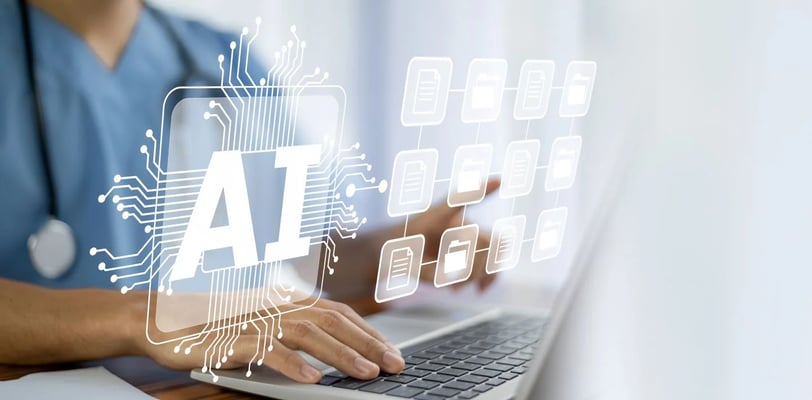How AI and Robotics Are Changing Medical Devices – The Future of Healthcare Technology
Technology is rapidly transforming the healthcare industry, and Artificial Intelligence (AI) and Robotics are at the forefront of this revolution. From robotic-assisted surgeries to AI-powered diagnostics, these innovations are making medical devices smarter, more precise, and more efficient. In this blog, we’ll explore how AI and robotics are changing medical devices, their benefits, and what the future holds for healthcare technology.
2/25/20252 min read


🔹 AI and Robotics in Medical Devices: A Game Changer
Medical devices have traditionally been used for diagnosis, monitoring, and treatment. However, with AI and robotics, these devices are now capable of:
✅ Making real-time decisions – AI can analyze data and suggest treatments.
✅ Performing precision-based surgeries – Robotic systems assist doctors in complex procedures.
✅ Personalizing patient care – AI adapts treatments to individual needs.
✅ Enhancing early disease detection – AI-powered imaging detects diseases before symptoms appear.
Let’s take a closer look at how AI and robotics are revolutionizing different areas of healthcare.
🔹 AI in Medical Devices: Smarter Healthcare Solutions
1️⃣ AI-Powered Diagnostics
AI can analyze X-rays, MRIs, and CT scans faster and more accurately than humans, helping doctors detect diseases early.
🔹 Example: AI algorithms can identify cancer in mammograms with higher accuracy than radiologists.
2️⃣ AI-Based Wearable Devices
Smartwatches and fitness trackers use AI to monitor heart rate, oxygen levels, and ECG readings, alerting users of potential health issues.
🔹 Example: The Apple Watch can detect irregular heart rhythms, helping in early diagnosis of heart conditions.
3️⃣ AI in Drug Development
AI is speeding up the process of discovering new drugs and predicting how they will interact with the human body.
🔹 Example: AI helped develop COVID-19 vaccines faster by analyzing virus structures and potential drug responses.
4️⃣ AI-Driven Personalized Treatment
AI can study a patient’s medical history, genetics, and lifestyle to recommend customized treatments.
🔹 Example: IBM Watson Health uses AI to create personalized cancer treatment plans based on patient data.
🔹 Robotics in Medical Devices: Precision and Automation
1️⃣ Robotic-Assisted Surgeries
Robots help surgeons perform minimally invasive surgeries with extreme precision, reducing recovery time and complications.
🔹 Example: The da Vinci Surgical System allows surgeons to perform complex procedures with robotic arms, improving accuracy.
2️⃣ Rehabilitation Robots
These robots help stroke patients and disabled individuals regain movement and strength.
🔹 Example: Exoskeleton robots help paralyzed individuals walk again by providing mechanical support.
3️⃣ Robotic Prosthetics and Implants
AI-powered prosthetics can adapt to a user’s movements and brain signals, improving functionality.
🔹 Example: Bionic arms and legs can sense nerve signals, allowing users to move them naturally.
4️⃣ Automated Lab Robots
Lab robots handle testing and diagnostics quickly and accurately, reducing human error.
🔹 Example: Robots in COVID-19 testing labs processed thousands of samples daily, speeding up diagnosis.
🔹 Benefits of AI and Robotics in Medical Devices
✔ Faster Diagnoses – AI analyzes medical data quickly, allowing for early disease detection.
✔ Higher Accuracy – Robotics and AI reduce human errors in surgeries and diagnostics.
✔ Better Patient Outcomes – Advanced technology improves treatments and recovery times.
✔ Increased Accessibility – AI-powered telemedicine makes healthcare available in remote areas.
✔ Reduced Healthcare Costs – Automation minimizes hospital stays and unnecessary procedures.
🔹 The Future of AI and Robotics in Healthcare
🚀 AI Chatbots for Virtual Healthcare – AI-driven chatbots will assist patients with symptoms, medication reminders, and basic consultations.
🚀 Nanorobots in Medicine – Tiny robots may deliver drugs directly to diseased cells, improving treatment effectiveness.
🚀 AI-Powered Hospitals – Smart hospitals will use AI to manage patient records, predict outbreaks, and optimize resource allocation.
🚀 Autonomous Surgical Robots – Future robotic systems might perform surgeries with minimal human intervention, improving precision and safety.
🔹 Conclusion
AI and robotics are revolutionizing medical devices, making healthcare smarter, faster, and more efficient. These innovations are not only improving diagnosis and treatment but also making healthcare more accessible and cost-effective.
As technology continues to advance, AI and robotics will play an even greater role in shaping the future of medicine, offering better patient care and saving more lives.
